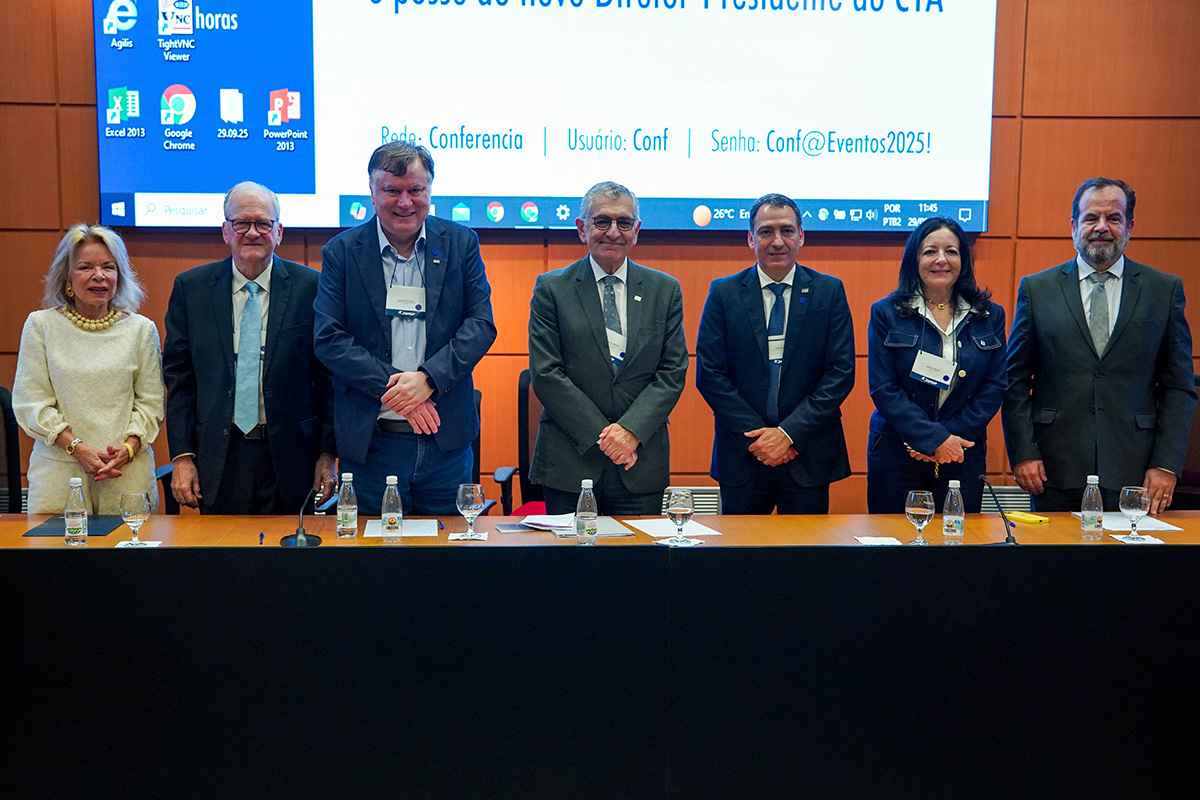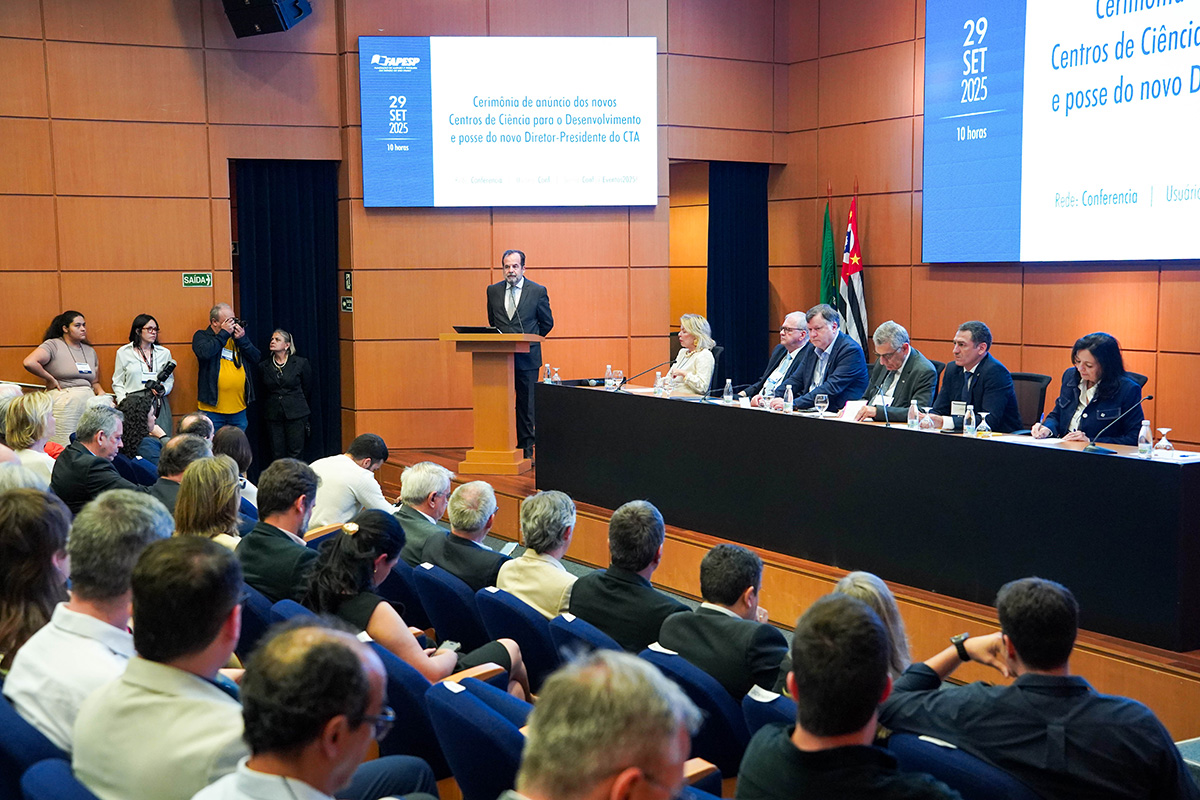

From left to right: Maria Arminda do Nascimento Arruda, Marco Antonio Zago, Marcos da Costa, Vahan Agopyan, Fraide Sales, Maysa Furlan, and Carlos Graeff (photo: Phelipe Janning/Agência FAPESP)
The fourth call for proposals for the program provides for investments of BRL 256 million. The announcement was made at a ceremony that also marked the start of Carlos Graeff’s term as the new CEO of the Executive Board.
The fourth call for proposals for the program provides for investments of BRL 256 million. The announcement was made at a ceremony that also marked the start of Carlos Graeff’s term as the new CEO of the Executive Board.

From left to right: Maria Arminda do Nascimento Arruda, Marco Antonio Zago, Marcos da Costa, Vahan Agopyan, Fraide Sales, Maysa Furlan, and Carlos Graeff (photo: Phelipe Janning/Agência FAPESP)
By Karina Toledo | Agência FAPESP – On September 29, FAPESP announced the creation of 34 new Science Centers for Development (SCDs), totaling an investment of BRL 256 million in collaborative research focused on specific social and economic issues in the state of São Paulo. The new centers, which bring together researchers from São Paulo universities and research institutions, as well as managers from state and municipal government agencies, companies, and non-governmental organizations (NGOs), are committed to producing results relevant to the advancement of knowledge and improvement of public policies within five years.
The projects selected in the fourth call for proposals of the SCD program involve partnerships with 17 state government agencies, several city halls, and municipal agencies. Topics covered include urban mobility and resilience, energy transition, food production and security, disability inclusion, educational innovation, digital security, and public management improvement through artificial intelligence. With the results of this call, FAPESP now supports a total of 83 SCDs, 49 of which were selected in previous calls. The complete list is available on the program’s website. The fifth call for proposals will be launched in October.
“In a time of uncertainty, it’s particularly reassuring to see that the scientific community in São Paulo is hopeful for the future, venturing into new projects, and training researchers. This confidence in our mission is essential to making science an instrument of national development, which is the central objective of this event,” said Marco Antonio Zago, president of FAPESP, at the opening of the ceremony.
According to Zago, combating disbelief in science and the spread of fake news is insufficient today. “We need to effectively promote science, technology, and innovation.”
“We’ve just released our 2024 Annual Report, which shows that research in São Paulo has shown strong signs of regaining momentum and overcoming the impact of the COVID-19 pandemic. FAPESP funded 27,000 scholarships and research grants in 2024. This represents an 18% increase over the previous year, a record number in the historical series. The total number of new projects contracted grew 26% from one year to the next. And the disbursement for funding was BRL 1.7 billion – 30% above the previous year. The good news is that scientific research and technological development are back. At least in São Paulo,” he said.
Zago recalled the history of the Science Centers for Development program, whose first call for proposals was launched in 2019 with an investment of BRL 52 million. These amounts increased with subsequent calls for proposals, reaching BRL 130.4 million in 2021, BRL 132 million in 2023, and BRL 256.4 million in the most recent call. “At the last meeting, the Board of Trustees authorized the opening of a new call for proposals in October, with investments of BRL 200 million,” he said.
Fraide Sales, São Paulo State Government’s Chief of Staff, pointed out that initiatives such as the SCDs help connect knowledge production with societal demands. “Research is nothing more than a study and a constant debate. And this debate is both with other researchers and with the demander. Even basic research is guided by a demand, a pain, a need of society,” he said. He highlighted the importance of focus and synergy “for the proper production and management of this knowledge.”
Marcos da Costa, the State Secretary for the Rights of Persons with Disabilities, stressed the importance of including science in the debate on inclusion. “One of the main areas we’ve sought to develop since day one [when he took office] has been science and research.”
Costa recalled initiatives aimed at inclusion that were supported by the 2023 SCDs program call for proposals. These initiatives aim to develop exoskeletons, accessible wheelchairs, prostheses, and orthoses, as well as technologies for deaf education and Brazilian Sign Language accessibility (read more at agencia.fapesp.br/52589). “All of these centers, comprising state and federal universities in São Paulo and entities such as the Brazilian Paralympic Committee, have this vision of developing technology that truly makes a difference in people’s lives. Congratulations to everyone here, to our researchers, and know that you’re making a difference in the lives of three million people,” he said.
In his speech, the State Secretary for Science, Technology, and Innovation Vahan Agopyan pointed out that society’s relationship with universities and research institutes has changed in recent decades, and today, it is necessary to demonstrate that these institutions exist to solve social problems. “We must engage with society. It isn’t [just] a matter of presenting our results, but of seeing what society expects from us,” he said.
According to the secretary, the Board of Trustees at FAPESP conceived the Science Centers for Development program as a strategy to demonstrate to the government that solutions to problems could be found. “I’d say that this fourth version [of the call for proposals] has already been a success. More than BRL 250 million – or USD 50 million – is a lot of money for research anywhere in the world,” he pointed out. “It’s an effort by São Paulo to solve the problems of our state and our municipalities.”
In a video message, Helena Nader, president of the Brazilian Academy of Sciences (ABC), congratulated FAPESP, the São Paulo State Government, and the academic community involved in the SCDs. She described the initiative as “visionary.” "The program isn’t just an initiative to promote research. It’s a bold model. A concrete and intelligent response to the complex challenges of our time. Its distinguishing feature, and with that, I believe, its virtue, is its intelligent design, which prioritizes coordination. This program promotes integration between academia, the non-academic productive sector, and government spheres,” she said.
By strengthening the dialogue between science, society, and government, Nader added that the program ensures the knowledge generated in universities and research institutes is not confined to laboratories. “It’s aimed at solving problems, increasing competitiveness, and improving public policies. Ultimately, we all want to improve the lives of the population,” she said.
Inauguration of the new CEO of the Executive Board
In addition to announcing the creation of the new SCDs, the event also celebrated the start of Carlos Graeff’s term as the new CEO of FAPESP’s Executive Board. Graeff was appointed by Governor Tarcísio de Freitas on August 27.

Graeff: “I reaffirm here my commitment to FAPESP’s mission, my commitment to ethics, transparency, and the transformation of the state through science, technology, and innovation” (photo: Phelipe Janning/Agência FAPESP)
“On behalf of the FAPESP Board of Trustees and the state’s scientific community, I’d like to congratulate Professor Graeff, assure him of our support for his administration, and wish him success in this endeavor. His success will be FAPESP’s success, to which we’re all committed. Leading FAPESP is a privilege and a special opportunity that few have access to. Although many are deserving of it, few end up reaching this position. Therefore, it’s a special position, as it’s the most successful subnational research support agency and the most prominent research support agency in the country today,” said Zago at the opening of the ceremony.
Graeff thanked the governor for his trust and highlighted FAPESP’s great impact on the science and innovation ecosystem in São Paulo and Brazil throughout its 63 years of existence. Among the commitments that will guide his work on the Executive Board, he mentioned scientific excellence, dialogue, and innovation. “It’s very important to create mechanisms so that this high-quality science can be turned into applications and social welfare for the whole of society. And that’s my other commitment,” he said. “I believe that FAPESP must be a home for everyone: academics, but also the government and businesspeople. So, I reaffirm here my commitment to FAPESP’s mission, my commitment to ethics, transparency, and the transformation of the state through science, technology, and innovation.”
Maysa Furlan, the dean of São Paulo State University (UNESP), was also present at the table and highlighted the “impressive quality” of Graeff’s academic career. Graeff is a professor in the Department of Physics at UNESP’s School of Sciences in Bauru and was formerly the institution’s vice-dean of research. “One of the reasons why UNESP is celebrating, Graeff, is your appointment here as CEO of the Executive Board,” she said. “I’m sure that FAPESP will benefit greatly from the important discussions and major projects, with the comprehensive and qualified perspective that you’ve always had.”
Furlan also pointed out that UNESP actively participates in the SCDs program due to its territorial coverage of 24 units in 24 cities in São Paulo. “And it also had a very significant approval in this fourth call. So, I’d like to wish you every success and say that the responsibility is very great.”
The event panel also included the participation of Maria Arminda do Nascimento Arruda, vice-dean of the University of São Paulo (USP).
The entire event can be viewed at www.youtube.com/live/EO6CWQ3k9kU.
Republish
The Agency FAPESP licenses news via Creative Commons (CC-BY-NC-ND) so that they can be republished free of charge and in a simple way by other digital or printed vehicles. Agência FAPESP must be credited as the source of the content being republished and the name of the reporter (if any) must be attributed. Using the HMTL button below allows compliance with these rules, detailed in Digital Republishing Policy FAPESP.





